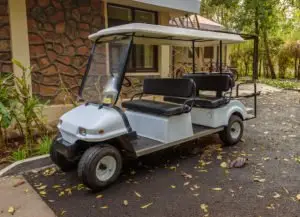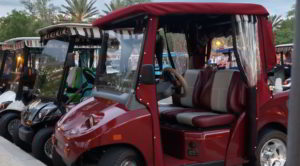
In general, Florida only allows you to drive a golf cart on a highway if it divides a subdivision, trailer park, or golf course. You do not have to title or register a golf cart with the state, either. When driving a golf cart in Florida, you still have to abide by the rules of the road, such as yielding the right of way.
Florida draws a distinction between golf carts and low-speed vehicles (LSV). The rules and regulations regarding these vehicles are different depending on their classification.
Low-Speed Vehicles vs. Golf Carts
Before you can understand the regulations for golf carts, you should understand what sets them apart from low-speed vehicles (LSV). Often, these two types of vehicles look identical and are often driven through residential areas.
How the Law Classifies Golf Carts and LSVs
According to Florida Statute § 320.01(42), an LSV is any four-wheel vehicle with a top speed that can travel faster than 20 miles per hour but less than 25. Essentially, an LSV occupies the space between golf carts and automobiles.
Meanwhile, Florida Statutes § 320.01(22) defines a golf cart as “a motor vehicle that is designed and manufactured for operation on a golf course for sporting or recreational purposes and that is not capable of exceeding speeds of 20 miles per hour.”
Confusingly, some vehicles marketed as golf carts can exceed 20 miles per hour, which technically makes them LSVs. However, the vast majority of electric golf carts can only travel below that speed.
Our Personal Injury Lawyers Are Ready To Fight for You. Contact Us Today.
Where You Are Allowed to Drive Golf Carts and LSVs
One thing that both golf carts and LSVs have in common is the ability to drive them in residential neighborhoods. However, an LSV may also operate on any public road with a speed limit no higher than 35 miles per hour.
Golf carts must avoid roadways, but according to Florida Statute 316.212, the operator of a golf cart may cross a highway if it divides a subdivision, trailer park, or golf course.
To consult with an experienced car accidents lawyer today, call 855-780-9986
Registration Requirements
Another important difference between golf carts and LSVs involves registration requirements. An owner has no obligation to title their golf cart or register it with the state. The same is not true for LSVs, however. The owner of an LSV must both title and register the vehicle similar to other motorized vehicles.
What’s more, it is possible to modify a golf cart into an LSV by altering its ability to travel above 20 miles per hour. When this happens, the owner must now comply with the state regulations on LSVs. The failure to do so could result in costly fines.
Moving Violations
Whether you are operating a golf cart or an LSV, Florida’s traffic laws apply. This is important because you could face a costly fine even while driving a golf cart on a quiet neighborhood road. While all moving violations have the potential to apply to golf carts, some that frequently result in citations include:
- Driving While Intoxicated. It is possible to face a DWI arrest for driving a golf cart while intoxicated. According to Florida Statutes § 316.003, a vehicle is a “device in, upon, or by which any person or property is or may be transported or drawn upon a highway, except personal delivery devices and devices used exclusively upon stationary rails or tracks.” This language has been found to apply to golf carts.
- Failure to Yield. Operators of golf carts often believe that because their vehicles are not full-fledged automobiles that the rules of road do not fully apply. A common example involves golf cart drivers failing to yield the right of way.
- Running a Stop Sign. Not all golf cart operators comply with the regulations regarding traffic control devices. These operators are liable for failing to stop for traffic lights or stop signs, just like motorists in passenger vehicles.
Click to contact our Florida Attorneys today
Driving at Night
Generally, you may only operate a golf cart during daylight hours. However, the rules regarding operating a golf cart at night vary from one city to another.
Some municipalities allow owners to operate their golf carts after dark as long as they have headlights, along with other safety equipment, including brake lights, reflectors, and turn signals. Other jurisdictions do not require turn signals but instead mandate windshields.
Submit a Consultation Request form today
Protect Your Rights As a Golf Cart Owner with an Attorney
The regulations and laws regarding golf carts in Florida are extensive. From licensing requirements to the right to drive on public roadways, there are countless laws that apply to the operation of these vehicles. These laws are further complicated by the need to differentiate between golf carts and LSVs.
Unfortunately, no amount of regulations can protect golf cart operators from the risk of an accident. When golf carts and motor vehicles collide, the outcome can be severe. If you suffered an injury in a golf cart accident, the team at Bogin, Munns & Munns is here to help. Call 407-578-9696 for a free consultation right away.
Call or text 855-780-9986 or submit our Consultation Request form today






